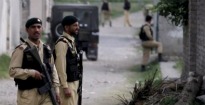Can America Defeat Pakistan's Spy Agency?
 Eli Lake reports:
Eli Lake reports:
In the stash of hard drives, thumb drives, and personal papers discovered in Osama bin Laden’s compound, one especially revealing find was his personal diary. According to an analyst privy to the frequent updates of translated material being posted to the intelligence community’s classified internet, the late Al Qaeda leader periodically recorded his amusement that U.S. drones were searching for him in the mountainous border region between Afghanistan and Pakistan while he was living comfortably less than a quarter of a mile from a Pakistani military academy. “Bin Laden was yukking it up about how clueless we were,” the source says.
The joke ended up being on bin Laden, but it’s worth asking why he felt so cocky. He was, after all, the world’s most wanted man, and yet there were only a few bodyguards at his compound. Did bin Laden believe he would be tipped off before a SEAL team knocked down his door?
To survive for six years in the posh Islamabad suburb of Abbottabad, bin Laden almost certainly relied on what might be called a “deep state”—a network of current and retired intelligence and military officers who are actively undermining the official policy of Pakistan’s government. “I have no doubt that members of Pakistan’s military and intelligence services knew of bin Laden’s whereabouts,” says Representative Steve Rothman, a New Jersey Democrat who sits on the House subcommittees that fund the military and foreign-aid budgets and who has attended top-secret briefings on the May 1 raid. “The question remains, however, how far that knowledge went up the command chain in Pakistan.”
All modern democratic societies have powerful national-security bureaucracies, but a deep state is a bureaucracy that has more power than the political leaders it ostensibly serves. One former senior U.S. counterterrorism official described Pakistan’s problem this way: “Imagine if the CIA was supporting the drug cartels of Mexico over the wishes of the Congress and the White House,” he said. “That’s what we have in Pakistan.” We know what it means to be at war with a sovereign nation—but how should a country fight a deep state?
The notion of a deep state that seeks to subvert an established government is often the stuff of conspiracy theories, but in the case of Pakistan, it’s an accurate description of the way a faction of its government appears to function. The United States itself had a hand in the creation of Pakistan’s deep state. In the 1980s, Pakistan’s Inter-Services Intelligence Directorate (ISI) backed the Afghan mujahedin in their fight against the Soviet Union, with money and guidance from the CIA. But after the Soviets withdrew and the CIA shifted its focus elsewhere, the ISI kept supporting fundamentalist Islamic groups like Lashkar-e-Taiba (LeT) in order to advance Pakistani interests in India and Afghanistan. “For the ISI it was the start of institutionalizing the use of militant Islam as a political tool,” says Art Keller, a retired CIA case officer who served in the agency’s Waziristan base in 2006.
Thanks to Pakistan’s rivalry with India, the deep state grew deeper still. Jane Harman, who chaired the House Homeland Security Subcommittee on Intelligence until 2010 and is now the president of the Woodrow Wilson Center, says, “This all has to do with what we may call paranoia and what they would call justifiable fear about ... the role India could play in an Afghanistan that we might leave.”
For most of the war on terrorism, U.S. policy failed to account for the problem the deep state posed. In theory, the United States was supposed to ally with Pakistan’s military against terrorist groups. And, from 2001 to 2005, that alliance appeared to work. After the September 11 attacks, President Pervez Musharraf fired the leadership of Directorate S, the ISI bureau responsible for maintaining relations with the Taliban, LeT, and other jihadist groups. The ISI also played an important role in the capture of Al Qaeda leaders Abu Zubaydah, Ramzi bin Al Shibh, and Khalid Shaikh Mohammed. Over time, however, Pakistan’s vigilance waned, and the old ISI hands and military officers that had nurtured these terrorist groups reasserted themselves.

